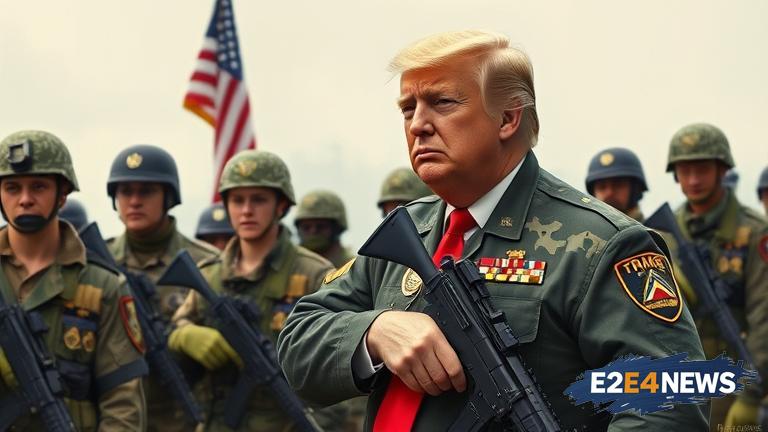The Trump administration has taken a significant step in enhancing law enforcement capabilities by creating a quick reaction force comprising out-of-state National Guard troops. This move is aimed at providing rapid support to law enforcement agencies in times of need. The decision has been met with a mix of reactions, with some hailing it as a necessary measure to maintain public safety, while others have raised concerns about the potential for militarization of law enforcement. The quick reaction force will be composed of National Guard troops from various states, who will be deployed to areas requiring additional support. The troops will undergo specialized training to equip them with the necessary skills to handle a range of scenarios, from crowd control to counter-terrorism. The deployment of out-of-state troops is intended to bring a fresh perspective and expertise to law enforcement operations, allowing for more effective management of complex situations. The Trump administration has emphasized that the quick reaction force will be used to supplement, rather than replace, local law enforcement agencies. The move is seen as part of a broader effort to enhance national security and public safety, with the administration citing the need for a more robust response to emerging threats. The use of National Guard troops for law enforcement purposes is not new, but the creation of a dedicated quick reaction force marks a significant escalation of this trend. The deployment of troops will be coordinated by the Department of Homeland Security, in conjunction with state and local authorities. The quick reaction force will be equipped with advanced technology and equipment, including surveillance drones and tactical vehicles. The troops will also receive training on de-escalation techniques and community engagement, in an effort to minimize the risk of conflict and build trust with local communities. Despite the potential benefits, some critics have raised concerns about the potential for abuse of power and the erosion of civil liberties. The American Civil Liberties Union (ACLU) has expressed concerns about the lack of transparency and oversight surrounding the deployment of troops. The organization has also warned about the potential for the quick reaction force to be used as a tool for suppressing dissent and free speech. Other critics have argued that the deployment of troops will only serve to exacerbate existing social and economic problems, rather than addressing their root causes. The Trump administration has dismissed these concerns, arguing that the quick reaction force is a necessary measure to maintain public safety and protect national security. The deployment of troops has also raised questions about the role of the military in domestic law enforcement, with some arguing that it blurs the line between civilian and military authority. The use of National Guard troops for law enforcement purposes has been authorized by the Posse Comitatus Act, which allows for the deployment of troops in support of civilian authorities. However, the act also imposes strict limitations on the use of troops, and requires that they be used only in exceptional circumstances. The Trump administration has argued that the deployment of the quick reaction force is justified by the exceptional circumstances of the current security environment. The move has been welcomed by some law enforcement agencies, who see it as a valuable resource in their efforts to maintain public safety. However, others have expressed concerns about the potential for the quick reaction force to undermine community trust and create new tensions. As the deployment of the quick reaction force begins, it remains to be seen how it will be received by local communities and whether it will achieve its intended goals. The Trump administration has pledged to monitor the situation closely and make adjustments as necessary. The use of out-of-state National Guard troops for law enforcement purposes is a significant development, and one that is likely to have far-reaching implications for public safety and national security. The creation of the quick reaction force marks a new era in the relationship between the military and law enforcement, and raises important questions about the role of the military in domestic affairs. As the situation continues to evolve, it is likely that there will be ongoing debate and discussion about the merits and drawbacks of the quick reaction force.
